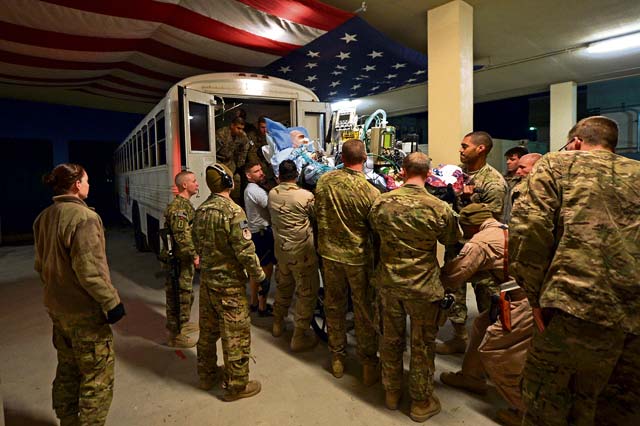
Editor’s note: This is the third in a six-part series about medical response capabilities of deployed service members from start to finish and the various milestones for care and transportation of combat-wounded troops throughout Afghanistan. To read Part I, click here! To read Part II, click here!
BAGRAM AIRFIELD, Afghanistan — When service members get sick or injured downrange, they need help not only physically but mentally. The transition from one medical treatment center to the next can be overwhelming and bring a service member’s morale down even further if not treated with care.
This transition is when the members of the Contingency Aeromedical Staging Facility are needed most. The Bagram Airfield CASF is the link between the Craig Joint Theater Hospital and aeromedical evacuation missions throughout Afghanistan.
The staging facility caters to both inbound and outbound patients brought in by the 455th Expeditionary Aeromedical Evacuation Squadron en route to Landstuhl Regional Medical Center for an upper level of medical attention.
“All the medical teams across Bagram come together to accomplish the movement of patients,” said 1st Lt. Kathryn Ellens, CASF registered nurse. “It’s amazing to see our capabilities and how quickly we can get a patient in and out.”
A few weeks ago, the CASF received a critical-condition patient that the CJTH did not have the equipment to treat. Within hours, Ellens and her team had that patient on a flight to LRMC.
“We average five flights a week to LRMC,” Ellens said. “Some patients have to stay here overnight, so our job is to keep them happy and healthy.”
Working 12-hour shifts, the CASF team keeps the facility open 24 hours a day, like a medical USO, ready to provide its patients with not only medical treatment, but quite possibly the first bit of home accommodations they have seen since their deployment.
“Every CASF I have worked at has always been set up to provide that ‘home feeling’ for the patients,” said Tech. Sgt. Thomas Humphreys, CASF flight chief. “We got the television going, the coffee and popcorn machines ready, anything to get them comfortable and ready for that next step of care.”
U.S. Army Staff Sgt. Jason Herron from Kandahar Airfield re-injured a dislocated shoulder from his last deployment, and even though he will only be at the CASF for a couple of hours, he has already enjoyed his time there.
“It is very laid back and relaxed,” Herron said. “I thought it was going to be more hectic like piles of paperwork, but they take care of everything for us.”
The CASF team provides a vital role in getting wounded warriors back home safely to their families. It doesn’t matter where the patients are from or who they are. The CASF treats each one with the utmost care.
“Our wounded warriors are our true heroes,” Humphries said. “To get to treat them and tell them thank you is very rewarding.”


